Abomasal Displacement
1/22
Earn XP
Description and Tags
Flashcards covering key concepts related to bovine abdominal surgery and abomasal displacement.
Name | Mastery | Learn | Test | Matching | Spaced | Call with Kai |
|---|
No analytics yet
Send a link to your students to track their progress
23 Terms
What is abomasal displacement?
Abomasal displacement refers to the abnormal positioning of the abomasum, typically seen in dairy cows.
LDA most common
RDA
RVA
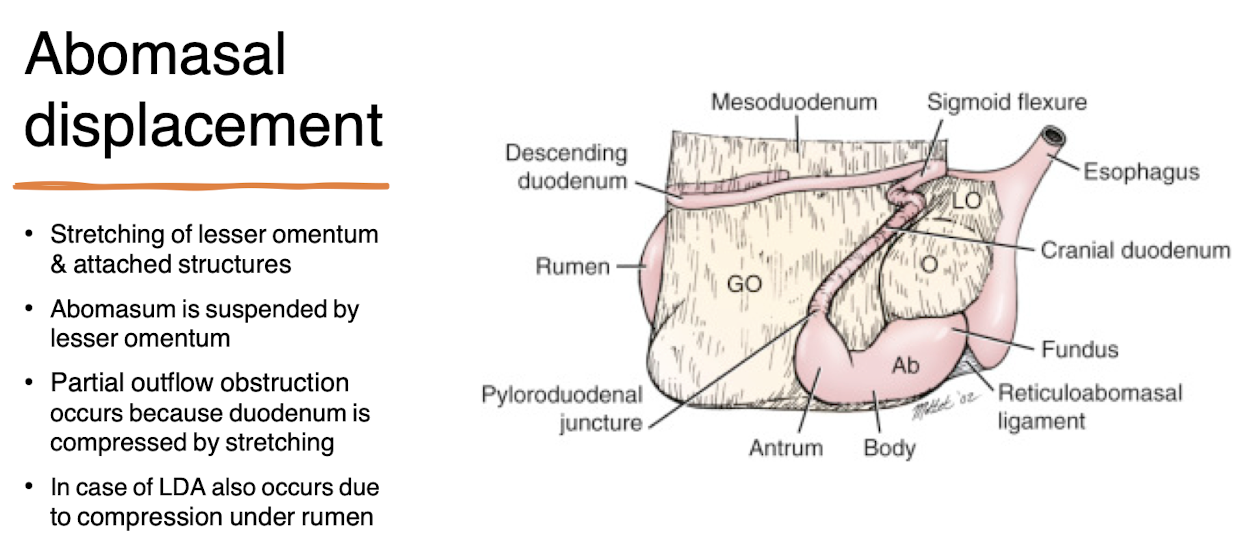
What are the common types of abomasal displacement?
The common types include Left Displacement of the Abomasum (LDA), Right Displacement of the Abomasum (RDA), and Right Volvulus of the Abomasum (RVA).
What are the predisposing factors for LDA?
Predisposing factors include reduced abomasal motility, accumulation of gas, early lactation(2-4weeks), anatomy(late pregnancy), genetics, nutrition(high concentrate low fibre rations), metabolic factors(inc insulin resistance, stress and age), management/environment
What are the clinical signs of abomasal displacement?
Clinical signs may include decreased milk production, depression, scant feces, and characteristic auscultation findings of a tympanic ping.
What diagnostic procedures are used for abomasal displacement?
Diagnosis may involve history taking, auscultation (ping), rectal examinations, tube passage into the rumen, and collection of rumen fluid
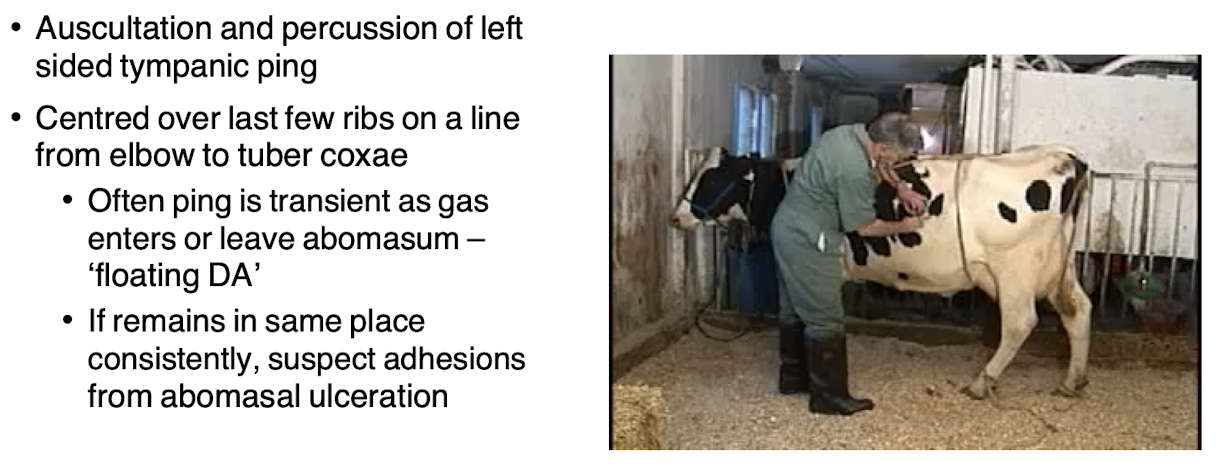
How can differentiate between issues with the rumen or abomasum?
Pass tube into the rumen and blow air and listen to paralumbar fossa for a rumen contraction sound; if absent, it suggests abomasal issues. Can also collect fluid from the rumen
Laboratory data for RDA
dec Cl, dec K, metabolic acidosis, hemoconcentration
Lab findings of RVA?
HCL in abomasum → more severe dec Cl, dec K, metabolic alkalosis, hypocalcemia, overriding metabolic acidosis from dehydration, shock, lactic acid production
What treatment options are available for LDA?
Treatment options include closed procedures like rolling and blind tack, toggle pin, nonsurgical treatment methods, and open surgical procedures such as omentopexy and abomasopexy.
What are the steps for spontaneous correction for LDA?
right lateral → dorsal 3 min → left lateral → sternal
Steps for blind, tack, toggle in LDA treatment
Restrain the animal
Insert needles to the left of the midline
Identify the abomasum by listening for a ping and smelling for abomasal fluid
Deploy the toggle pins.
Different treatment options for LDA surgery?
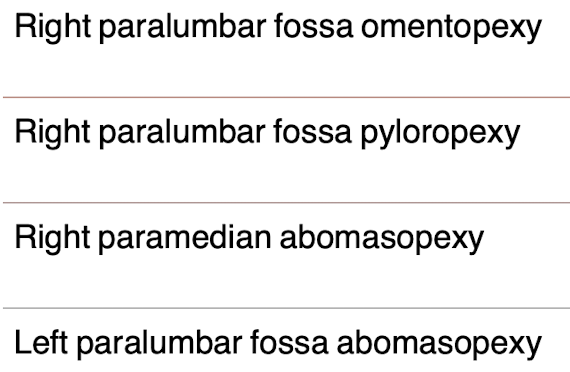
What is the right paralumbar fossa omentopexy?
A surgical procedure used to correct left displaced abomasum by attaching the omentum to the abdominal wall in the right paralumbar fossa, stabilizing the abomasum in its proper position.
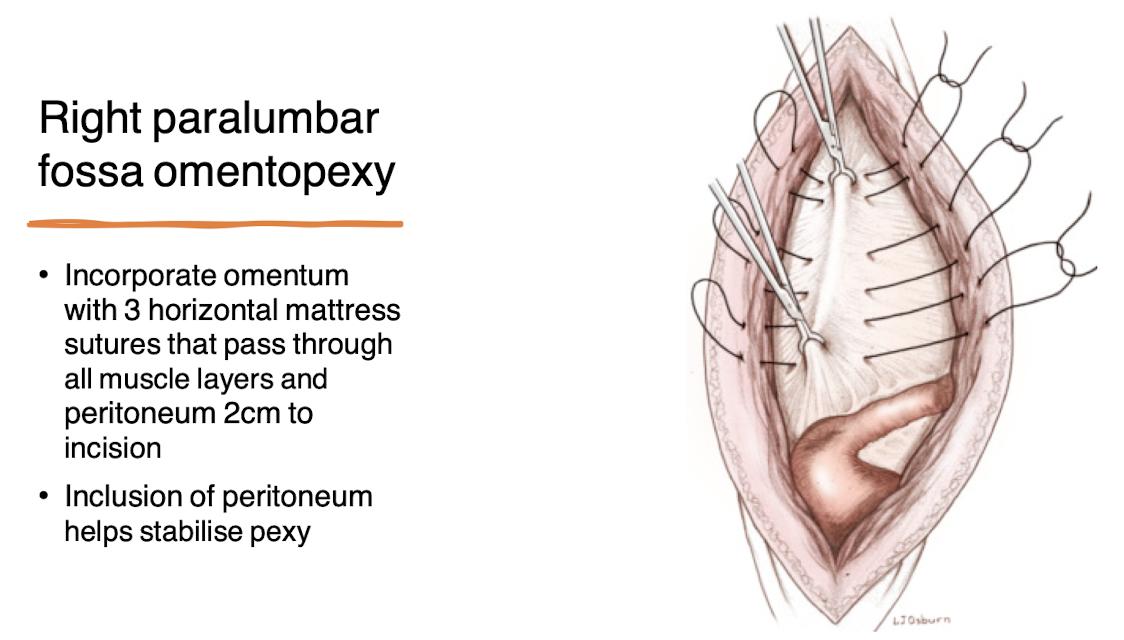
What are some potential complications of surgical treatments for LDA?
Complications can include abomasal rupture, peritonitis, redisplacement, and infection.
What is the prognosis for cows following abomasopexy procedures?
Prognosis for cows following abomasopexy procedures can range from 85-95%.
What role does nutrition play in the development of abomasal displacement?
High concentrate low fiber rations during the periparturient period can lead to negative energy balance, influencing the risk of developing DA.
What is the significance of the lesser omentum in abomasal displacement?
The lesser omentum suspends the abomasum and is involved in the pathogenesis of abomasal displacement as it can stretch and compress other structures.
What is a pyloropexy without omentopexy?
A surgical procedure used to fix the abomasum in its normal position without utilizing the omentum for support, often performed to correct abomasal displacement.

What is Pyloropexy with omentopexy?
A surgical procedure that fixes the abomasum in its normal position while using the omentum for additional support, often indicated for abomasal displacement.

What is a right paramedian abomasopexy?
A surgical technique used to correct right abomasal displacement by suturing the abomasum to the right abdominal wall, providing stability to the organ.
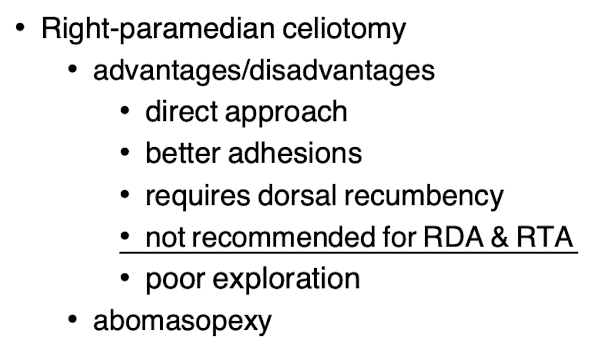
What is the ideal site for abomasopexy?
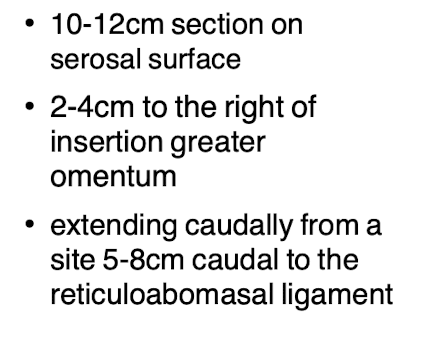
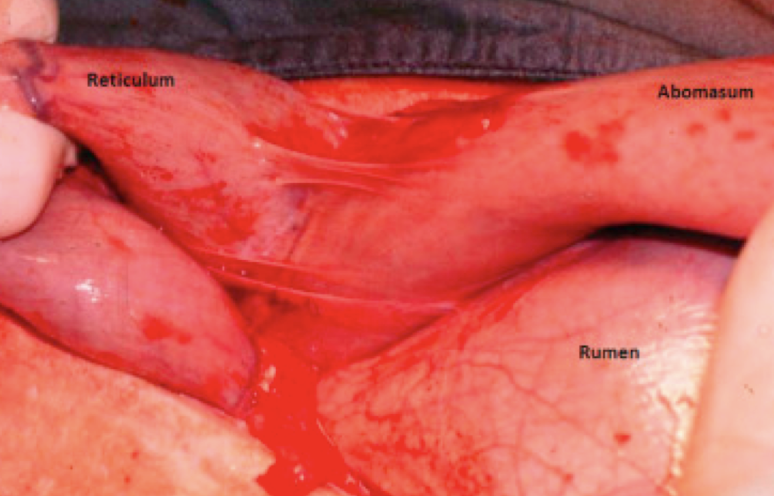
What suture material do we want to use for a right paramedian abomasopexy?
Non-absorbable monofilament suture material, such as polypropylene, is preferred for durability in securing the abomasum.
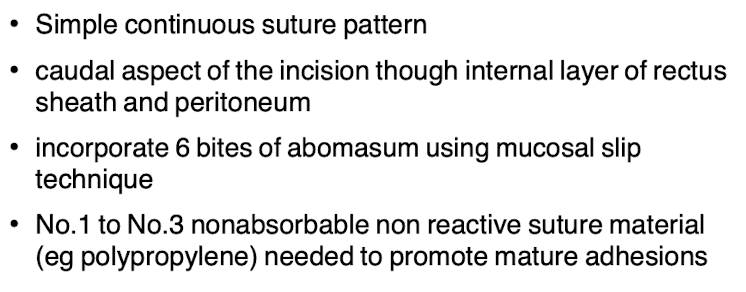
What is the left paralumbar fossa abomaspexy?
A surgical technique for correcting left abomasal displacement by anchoring the abomasum to the left abdominal wall, similar in principle to right paramedian abomasopexy.
better access to greater curvature of abomasum for ashesiolysis
safe approach for 3rd trimester pregnancy